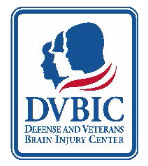Lawmakers Express Concern about Discharges Possibly Related Medical Conditions
By Sandra Basu

3 Question DVBIC TBI Screening Tool
WASHINGTON—Diagnosing and treating mild traumatic brain injury continues to pose challenges for clinicians, TBI experts told lawmakers.
“Even for those of us who have been examining patients for over 20 years, the signs can be so subtle that they are not picked up on the routine bedside neurological examination,” explained David Dodick, MD, sports neurology and concussion program director for the Mayo Clinic.
Dodick pointed out that, “even when the diagnosis of concussion is made, the challenge of managing the patient is difficult, because there are no pharmacological agents—not a single one—that has been shown to be effective in improving symptoms or interrupting that secondary injury cascade that occurs.”
Those comments were made at a recent Senate Committee on Armed Services Personnel Subcommittee hearing where lawmakers questioned experts from the civilian sector and federal sector regarding the state of mTBI care and research.
Calling it a “national problem” Sen. Thom Tillis (R-NC) said the nation “must pursue multiple approaches to understand better the chronic effects of mild TBI, including the long-term neurodegenerative problems associated with multiple concussive injuries.”
“From 2000 through the first half of 2017, the Department of Defense diagnosed over 370,000 servicemembers with TBI. Of that total number of diagnoses, over 305,000 were mild TBIs. We know, however, that mild TBI is not a unique problem within the Department of Defense,” he said.
Navy Capt. Michael Colston, MD, director of Military Health Policy and Oversight for the Assistant Secretary of Defense for Health Affairs, said DoD’s mandatory screening program “promotes early identification of servicemembers with concussion.” At the same time, the MHS “remains focused on hard problems around diagnostic clarification,” because of the need “to get return-to-duty determinations, administrative dispositions and medical disability findings right.”
Colston said the military is not alone in its efforts, explaining, “DoD conducts state-of-the-science research as part of the National Research Action Plan, which coordinates our research priorities with VA and NIH. DoD also collaborates in the national effort to characterize degenerative conditions stemming from subconcussive events or blast exposures.”
As for VA programs, Joel Scholten, MD, Washington DC VAMC Associate Chief of Staff of Staff for Rehabilitation, told lawmakers that, between 2007 and 2017, VA screened more than 1.1 million veterans and diagnosed more than 93,000 of those veterans with a history of a mild TBI. In fact, VA spent more than $35 million in TBI research on 164 projects in FY 2017, Scholten said.
Another speaker, Christopher Miles, MD, associate director of the Wake Forest University Sports Medicine Fellowship program, emphasized that collaboration “between military and civilian clinicians and researchers in tackling the best way to diagnose and treat concussions is crucial.”
“Although the causes of injuries may be different, though certainly not always, the importance of being able to accurately diagnose and provide the best treatment is the same,” Miles added, noting that the development of “an objective test that will help diagnose and guide the management of this condition” is crucial.
Current concussion tools are in use, such as the King-Devick, but he decried the lack of “a gold standard for concussion testing,” adding, “If an imaging or a blood test similar to what we have for evaluating heart attacks were to be discovered, the evaluation and management could be standardized.”
Other-Than-Honorable Discharge
During the hearing, lawmakers expressed concern about whether troops suffering from TBI, post-traumatic stress disorder (PTSD) and other service-connected conditions are too frequently dishonorably discharged for actions that result from their injuries. That makes them potentially ineligible for VA health benefits.
“Bad-paper discharges are too often a consequence of suffering from military-induced conditions and result in veterans not being eligible for care for these conditions from the VA,” Ranking Member Sen. Kirsten Gillibrand (D-NY) said. She asked what VA and DoD are doing to protect servicemembers who may have been punished for behavior possibly linked to TBI or PTSD.
Colston responded that those former military personnel have opportunities for reclama, a request to duly constituted authority to reconsider its decision or its proposed action, through boards of correction for military records. DoD has also implemented an across-the-board “look at people who had medical boards stopped for one reason or another,” such as disciplinary reasons, he said.
The VA implemented a policy change last year to allow urgent mental health treatment for veterans with an other-than-honorable discharge, Scholten pointed out. “With implementation of that policy for those individuals that can access for urgent mental health needs, during that time, that episode of care can last up to 90 days, during which time we can investigate the background, their clinical presentation and determine possibly if their benefit profile should be changed.”
VA and DoD also announced last month a new web-based tool that will provide help to veterans who want to upgrade or change the conditions of their military discharge. A VA announcement explained that “The military has estimated that tens of thousands of veterans with less than honorable discharges are especially likely to have unjust discharges deserving of upgrades. These are veterans who were discharged due to incidents relating to post-traumatic stress disorder, traumatic brain injury or sexual orientation.”


